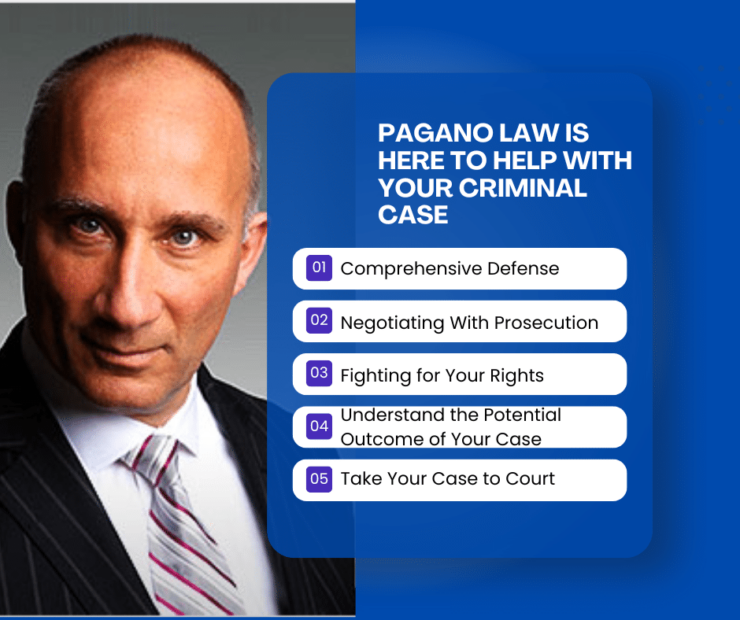Philadelphia Retail Theft Lawyer
Experienced Defense Against Shoplifting and Retail Theft Charges in Pennsylvania
Being accused of retail theft can be an overwhelming experience that threatens your reputation, employment, and future opportunities. Whether you face charges for allegedly shoplifting merchandise worth twenty dollars or several hundred dollars, Pennsylvania law treats retail theft seriously, and a conviction can result in criminal penalties, civil liability, and long-lasting consequences that extend far beyond the immediate legal proceedings.
At Pagano Law, we understand that retail theft accusations often involve misunderstandings, false accusations, or momentary lapses in judgment that do not reflect our clients’ true character. Our Philadelphia criminal defense team has extensive experience defending individuals against retail theft charges, providing aggressive representation while working to minimize the impact of these allegations on your life and livelihood.

Understanding Retail Theft Under Pennsylvania Law
Pennsylvania’s retail theft statute encompasses a broad range of conduct that extends well beyond the traditional concept of shoplifting. The law defines retail theft as unlawfully taking merchandise from a retail establishment, altering or removing price tags with intent to deprive the merchant of the full retail value, transferring merchandise from one container to another, or attempting to under-ring merchandise at checkout.
The prosecution must prove several elements to secure a retail theft conviction, including that the defendant intentionally took merchandise, that they intended to deprive the retailer of the merchandise or its full value, and that they acted without the consent of the merchant. Understanding these legal elements is crucial for developing an effective defense strategy that challenges the prosecution’s case at its foundation.
Many retail theft cases involve allegations of concealment, where prosecutors claim that hiding merchandise demonstrates intent to steal. However, Pennsylvania law recognizes that concealment alone does not necessarily prove theft, as customers may legitimately conceal items while continuing to shop with the intention of purchasing the merchandise at checkout.
The circumstances surrounding each retail theft allegation vary significantly, from cases involving alleged shoplifting by individuals with no prior criminal history to more complex situations involving organized retail theft rings or employees accused of stealing from their employers. In some cases, prosecutors may also claim the incident involved force, threats, or confrontation—allegations that can shift the case into robbery charges in Philadelphia and raise the stakes dramatically. Each scenario requires a tailored defense approach that addresses the specific facts and legal issues involved in the case.
“Attorney Greg Pagano gave my son’s case all the time and attention that was needed to be successful in a 12 Jury Trial/Homicide Case.
He made sure that the truth was told and presented it perfectly in court. Hands down the best Attorney in the City of Philadelphia!“
“Mr Greg Pagano and Sarah Jones have been representing my sons and several family members for some years and did a outstanding job winning there cases On July 29. 2021 Greg got my son gun charge dismissed .Mr Pagano and his team are passionate about what they do and made sure our needs were meet and kept us informed every step of the way.“
“Mr. Pagano and his associates are wonderful lawyers! The been working with my family for some time now, they are committed to winning cases. Mr. Pagano and his associates are loving, caring lawyers they treat their clients with respect and like family. They made sure all unanswered question are answer; they make sure everything is explain to great details. They recently won my son’s case!!!!“

Penalties and Consequences of Retail Theft Convictions
The penalties for retail theft convictions in Pennsylvania depend primarily on the value of the allegedly stolen merchandise and the defendant’s prior criminal history. For merchandise valued under one hundred fifty dollars, retail theft is typically charged as a summary offense punishable by up to ninety days in jail and fines reaching three hundred dollars for first-time offenders.
When the value of allegedly stolen merchandise exceeds one hundred fifty dollars but remains under two thousand dollars, prosecutors typically file misdemeanor charges that carry potential penalties of up to two years in prison and fines reaching five thousand dollars. These enhanced penalties reflect Pennsylvania’s recognition that higher-value retail theft cases represent more serious criminal conduct.
Repeat offenders face significantly harsher consequences, as Pennsylvania law provides for escalating penalties based on prior retail theft convictions. A second retail theft offense within five years of a prior conviction elevates the charges to misdemeanor level regardless of the merchandise value, while third and subsequent offenses can result in felony charges carrying potential prison sentences of several years.
Beyond the immediate criminal penalties, retail theft convictions create lasting consequences that can impact employment opportunities, professional licensing, educational prospects, and personal relationships. Many employers conduct background checks and may be reluctant to hire individuals with theft convictions, particularly for positions involving money handling, inventory management, or customer service responsibilities.
Professional licenses in fields such as healthcare, finance, education, and law can be suspended or revoked following theft convictions, potentially ending careers that individuals have spent years building. Educational institutions may also deny admission or financial aid to applicants with criminal records, limiting opportunities for personal and professional advancement.

Common Defenses Against Retail Theft Charges
Defending against retail theft charges requires a comprehensive analysis of the evidence and circumstances surrounding the alleged offense. At Pagano Law, we examine every aspect of our clients’ cases to identify potential defenses and weaknesses in the prosecution’s evidence that can be exploited to achieve favorable outcomes.
Lack of intent represents one of the most common and effective defenses in retail theft cases. The prosecution must prove that the defendant specifically intended to steal the merchandise, which can be challenging when the evidence suggests absent-mindedness, confusion, or genuine mistake. Elderly defendants, individuals with medical conditions affecting memory or cognition, and parents distracted by young children may have legitimate explanations for leaving stores without paying for merchandise.
False accusations and mistaken identity also occur frequently in retail theft cases, particularly in busy stores where security personnel may not have clear views of alleged criminal conduct. Surveillance footage may be unclear or incomplete, witness identifications may be unreliable, and store employees may jump to conclusions based on suspicious but innocent behavior.
We also examine whether store security personnel followed proper procedures when detaining and investigating alleged shoplifters. Pennsylvania law provides specific protections for consumers, and retailers who exceed their authority when detaining suspected shoplifters may face civil liability while potentially compromising the criminal case against the accused individual.
The prosecution’s ability to prove the value of allegedly stolen merchandise can also present opportunities for defense. Inaccurate pricing, sale prices not reflected in the charges, or disputes about the actual retail value of items can result in reduced charges or dismissed cases when the evidence does not support the alleged merchandise value.
Challenging Evidence and Witness Testimony
Modern retail establishments rely heavily on surveillance cameras, electronic article surveillance systems, and loss prevention personnel to detect and prevent theft. While this technology can provide valuable evidence for prosecutors, it also creates opportunities for defense attorneys to challenge the accuracy and reliability of the evidence against their clients.
Surveillance footage may not capture the complete sequence of events, may be of poor quality that makes identification difficult, or may be subject to multiple interpretations about what actually occurred. Our legal team carefully reviews all available video evidence to identify gaps, inconsistencies, or alternative explanations for the conduct that prosecutors claim demonstrates criminal intent.
Loss prevention officers and store employees who testify about alleged retail theft incidents may have limited training in proper observation and detention procedures. Their testimony can be challenged based on their vantage point during the alleged incident, their familiarity with store policies and procedures, and their ability to accurately identify and remember specific details about the defendant’s conduct.
Electronic article surveillance systems, while generally reliable, can malfunction or trigger false alarms due to legitimate merchandise that customers purchased elsewhere, medical devices, or other metallic objects. Understanding how these systems work and their potential limitations allows defense attorneys to raise reasonable doubt about the significance of alarm activations.

Civil Demand Letters and Retail Theft Civil Penalties
Many individuals charged with retail theft also receive civil demand letters from retailers seeking monetary compensation beyond any criminal penalties. Pennsylvania law allows merchants to pursue civil remedies against alleged shoplifters, including recovery of the merchandise value, civil penalties, and attorney fees.
These civil demand letters often arrive shortly after the criminal charges are filed, demanding payment of several hundred dollars regardless of the merchandise value or whether the individual has been convicted of any criminal offense. The letters typically contain threatening language suggesting that failure to pay will result in additional legal action and increased financial liability.
At Pagano Law, we advise clients about their rights and options regarding civil demand letters, including when payment may be appropriate and when the demands should be challenged. Paying these civil penalties does not resolve the criminal charges, and individuals should not assume that payment will result in dismissal of the criminal case.
The relationship between criminal prosecution and civil liability in retail theft cases can be complex, and decisions about how to respond to civil demand letters should be made in consultation with experienced criminal defense attorneys who understand how these parallel proceedings may affect each other.
“Greg Pagano and his team are a group of intellectual and educated forces. Not only did he and his team win a Double Murder Case for my family he also won a case of illegal search and seizure of my son’s car that was pulled over by the Philadelphia Police illegally.“
“Greg, and his assistant Sarah provided my son with excellent legal representation. You can use any lawyer but its clear Greg is head and shoulders above his peers. His reputation in the courthouse and his professionalism carries a lot of weight in his dealings with the DA’S. He used his skill to get the best outcome possible for our family and for that I am grateful. Do not hesitate to use Mr. Pagano. It will be a wise investment and money well spent.”
“Greg is very good at what he does which is practicing law. His team is very professional and caring for ensuring and working on your cases and being very communicating with you through all the process.”
Diversion Programs and Alternative Resolutions
Pennsylvania courts recognize that many retail theft defendants are first-time offenders who made poor decisions rather than career criminals who pose ongoing threats to public safety. Various diversion programs and alternative sentencing options may be available to help defendants avoid the long-term consequences of criminal convictions while still addressing the underlying conduct.
Accelerated Rehabilitative Disposition programs allow qualifying defendants to complete probationary terms, community service, counseling, or other requirements in exchange for dismissal of the charges upon successful completion. These programs are particularly valuable for first-time offenders who can demonstrate that their conduct was aberrant and unlikely to recur.
Some jurisdictions offer specialized retail theft diversion programs that focus specifically on educating defendants about the impact of retail theft on businesses and communities. These programs may include workshops about impulse control, financial management, or substance abuse issues that may have contributed to the alleged criminal conduct.
Our attorneys work closely with prosecutors and probation departments to identify appropriate alternative resolutions that address our clients’ individual circumstances and needs. This may include negotiating for reduced charges, deferred sentencing arrangements, or other creative solutions that minimize the long-term impact of retail theft allegations.

Protecting Professional and Educational Opportunities
For many clients facing retail theft charges, the potential impact on their professional and educational goals represents a greater concern than the immediate criminal penalties. Teachers, healthcare workers, financial professionals, and other licensed professionals may face disciplinary action from regulatory boards even for minor retail theft convictions.
Students applying to colleges, graduate schools, or professional programs may be required to disclose criminal convictions and explain the circumstances surrounding their charges. A thoughtful approach to resolving retail theft cases can help minimize these collateral consequences and preserve future opportunities.
At Pagano Law, we work with clients to understand their specific professional and educational goals so that we can advocate for resolutions that protect these important interests. This may involve negotiating for specific plea agreements, pursuing expungement opportunities, or developing comprehensive mitigation packages that demonstrate our clients’ character and commitment to making positive changes.
Professional licensing boards and educational institutions often consider the specific circumstances surrounding criminal charges, the individual’s response to the incident, and evidence of rehabilitation when making decisions about disciplinary action or admission. Proper legal representation can help ensure that these decision-makers have complete and accurate information about our clients’ situations.

The Investigation and Evidence Gathering Process
Effective defense of retail theft charges begins with a thorough investigation of the allegations and the circumstances surrounding the alleged incident. Our legal team works quickly to preserve evidence, interview witnesses, and identify potential defenses before memories fade and evidence becomes unavailable.
Store surveillance systems typically retain footage for limited periods before it is automatically deleted or overwritten. We move immediately to ensure that all relevant video evidence is preserved and properly analyzed by qualified experts who can provide objective assessments of what the footage actually shows.
Witness statements from store employees, security personnel, and customers who may have observed the alleged incident can provide crucial insights into what actually occurred. These witnesses may have observed conduct that contradicts the prosecution’s theory of the case or may have information that supports the defendant’s explanation of events.
We also examine store policies and procedures for detecting and responding to alleged retail theft incidents to determine whether proper protocols were followed. Deviations from established procedures may provide grounds for challenging the evidence or seeking dismissal of charges based on improper detention or investigation methods.
Building Character Evidence and Mitigation
Retail theft cases often present opportunities to demonstrate that the alleged conduct was completely out of character for the defendant and unlikely to recur. We work with clients to gather character references, employment records, community involvement documentation, and other evidence that provides a complete picture of who they are beyond the specific allegations they face.
Mental health issues, substance abuse problems, financial stress, or other personal circumstances may have contributed to the alleged retail theft incident. Addressing these underlying issues through counseling, treatment, or other appropriate interventions can demonstrate genuine remorse and commitment to preventing future problems.
Community service, charitable contributions, or other efforts to give back to the community can help demonstrate that defendants understand the impact of their alleged conduct and are committed to making positive contributions to society. These mitigation efforts can influence prosecutors’ charging decisions and judges’ sentencing determinations.
Educational or vocational achievements, military service, family responsibilities, and other positive aspects of defendants’ lives help provide context for understanding how they found themselves facing retail theft charges. This comprehensive approach to case preparation ensures that decision-makers see our clients as complete human beings rather than simply as alleged criminals.
Why Choose Pagano Law for Your Retail Theft Defense
Retail theft charges may seem minor compared to other criminal offenses, but the consequences of conviction can be surprisingly severe and long-lasting. At Pagano Law, we understand that our clients need more than just legal representation – they need advocates who will fight to protect their reputations, their careers, and their futures.
Our experience defending retail theft cases has taught us that early intervention and aggressive advocacy can often result in favorable outcomes even when the evidence initially appears strong. We know how to challenge the prosecution’s evidence, negotiate with district attorneys for reduced charges or alternative resolutions, and present compelling mitigation evidence that demonstrates our clients’ true character.
Every retail theft case is unique, and we take the time to understand our clients’ individual circumstances, concerns, and goals so that we can develop defense strategies tailored to their specific needs. Whether you are a first-time offender facing minor charges or someone with prior convictions confronting serious penalties, we provide the personalized attention and aggressive representation your case deserves.
If you have been accused of retail theft in Philadelphia, do not underestimate the potential consequences of these charges or assume that you can handle the case on your own. Contact Pagano Law today to schedule a confidential consultation and learn how our experienced criminal defense team can help protect your rights and your future. The sooner you have qualified legal representation, the better positioned you will be to achieve a favorable resolution of your case.

